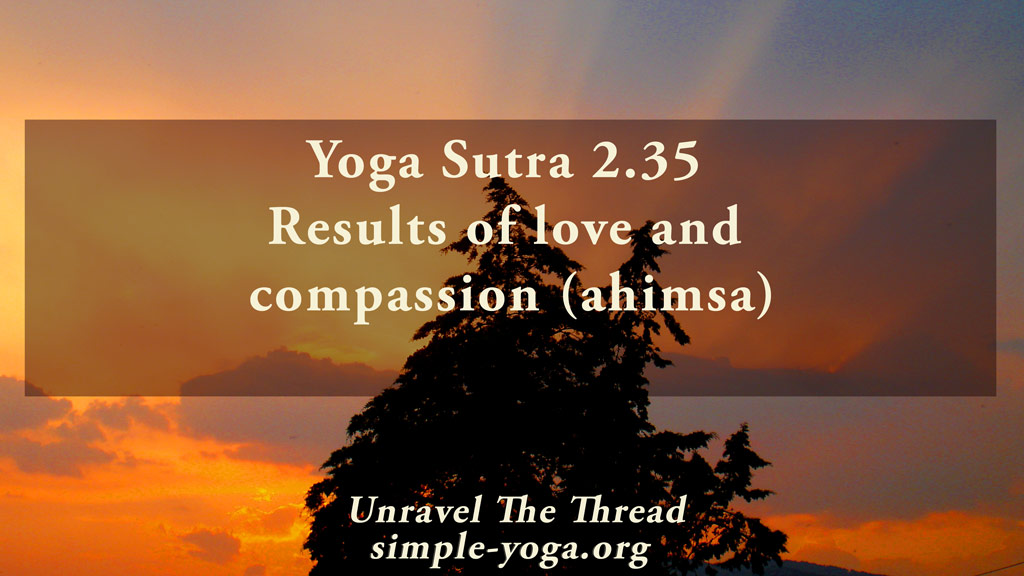Yoga Sutras 2.30-2.34: Pautas para reducir tension y forcejeos
December 7, 2020
2.36 Results of integrity (satya)
December 18, 2020Yoga Sutras 2.30-2.34: Pautas para reducir tension y forcejeos
December 7, 2020
2.36 Results of integrity (satya)
December 18, 20202.35 Results of love and compassion (ahimsa)

2.35 The person established in love and compassion (ahimsa), becomes a positive peaceful influence everywhere she or he goes.
Have you ever seen someone you didn’t know fall on the street and you immediately felt a visceral reaction that somehow communicated some of their discomfort and pain to you? This is our nature, and perhaps, as others have pointed out before, the fact that you can relate to others’ misfortunes at a visceral level may be more than just a physiological reaction. Could it be that when you feel somebody else’s pain, suffering, and discomfort you are feeling the deep connection between all living beings? Is it possible that what you feel is the oneness of all of life? This inquiry alone is worth contemplating.
Besides, it is critical to be aware that it takes a lot of training and repetition to get us humans to dehumanize other human beings in order to be able to overrule and ignore our instinct towards empathy and connection. This relatedness is not limited to seeing somebody in distress. It also happens as you see somebody achieve something momentous causing you to feel emotional. The first of the yamas, to live with love and compassion, is an invitation to open your heart. When your heart opens, your mind opens, and then you can recognize that the prevalent narrative portraying the world as a hostile environment where fierce competition is the rule and only the strongest survive is not quite correct. A more accurate and useful perspective is to see that cooperation is the only way human beings have been able to survive and thrive, because nothing our species has accomplished has ever been the result of one person working in isolation. Instead, all human accomplishments are the accumulation of all kinds of contributions by many different people over time. Even people who create alone are benefitting from food, shelter, and the support of those around them. If you are benefitting from having running water, electricity, and access to communication technologies, the list of contributors who made those comforts possible is long.
Does the practice of love and compassion feel like you are dehumanizing yourself? Or does it feel like you are reconnecting to your true human nature? The practice of ahimsa is one way to create a garden of love and compassion in your heart so that you can become an abode of peace, love, and compassion in body, mind, and emotions. As with any garden, this garden begins with a gradual process of preparing the terrain – identifying what thoughts, feelings, and opinions are conducive to planting love, maybe by using the suggestions from sutra 1.33. As you embody calm, peace, love, and compassion, is it possible that your presence alone already starts to communicate it to others even without words? Is this how you can become a positive influence wherever you go? Some additional questions to guide your journey towards ahimsa:
What enables you to open your heart?
How are you cultivating compassion and kindness towards yourself?
How are you cultivating compassion and kindness towards others?
How are you fostering a peaceful mindset and personal environment in your daily activities?
You may also invite ahimsa through mindful actions. For instance, for a full day, for three days or a full week, you may try to make your movements, breath, and actions smooth, gentle, and deliberate. Observe what happens inside and around you as a result.
As usual, one more way of exploring the meaning of this sutra is by chanting it.
You can choose to chant it in its traditional form with some of the words coming together:
2.35 ahiṃsāpratiṣṭhāyaṃ tatsannidhau vairatyāghaḥ
अहिंसाप्रतिष्ठायं तत्सन्निधौ वैरत्याघः ॥३५॥
Another option is to chant each word in the sutra individually:
- ahiṃsā
- pratiṣṭhāyaṃ
- tat
- sannidhau
- vaira
- tyāghaḥ
If you prefer, you may listen to the podcast:
Unravel the thread is now available as a book!
If you find Simple-Yoga.org and Unravel the thread useful, consider supporting my labor with a donation, you may also donate using PayPal or Venmo. Thank you!
